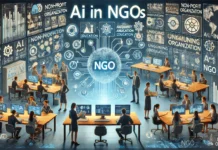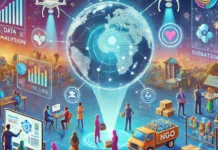AI is transforming how NGOs connect with donors. From improving personalization to optimizing communication, AI offers innovative ways to boost engagement. Let’s explore eight practical methods for NGOs to strengthen donor relationships using AI.
1. Personalizing Donor Communication
Personalized communication is key to engaging donors meaningfully, and AI makes this process seamless and effective. By analyzing donor data, such as past contributions, communication preferences, and interaction history, AI tools can craft messages tailored to each individual donor.
For example, AI can segment donors into specific groups based on their giving patterns, interests, or frequency of engagement. This segmentation enables NGOs to send targeted messages that resonate more deeply with each donor.
AI also suggests the most appropriate tone, style, and timing for outreach. For instance, a donor who prefers a professional approach will receive a formal email, while a donor who values a warm and friendly tone may get a more casual message. Timing is another critical factor—AI can determine when a donor is most likely to respond, ensuring outreach happens when it will have the greatest impact.
Beyond email, AI can personalize communication across various channels, including social media, text messaging, and direct mail campaigns. This omnichannel personalization fosters stronger emotional connections with supporters, making them feel valued and understood.
As a result, NGOs can not only improve response rates but also nurture long-term relationships with their donors, leading to greater retention and ongoing support. In the competitive non-profit landscape, such personalization can be a game-changer in driving sustained donor engagement.
2. Predicting Donor Behavior
AI empowers NGOs to anticipate donor actions with remarkable precision. By analyzing historical donor data—such as donation frequency, amounts, and timing—AI algorithms identify patterns and trends that human analysis might overlook.
For example, AI can flag donors who are likely to make repeat contributions during certain months or after specific events. With this information, NGOs can proactively design campaigns that align with these patterns, reaching donors at the optimal time when they’re most likely to give.
Moreover, AI tools can segment donors into groups based on their behavior. This allows NGOs to craft personalized messages tailored to different donor profiles—such as one-time contributors, recurring donors, or lapsed supporters. This targeted approach not only improves the chances of re-engagement but also fosters stronger relationships with donors by making them feel understood and valued.
By leveraging predictive insights, NGOs can avoid guesswork and focus their efforts on high-potential opportunities, ultimately increasing donor retention rates and overall fundraising success.
3. Enhancing Crowdfunding Campaigns
AI brings a new level of efficiency and precision to crowdfunding efforts. One of its greatest strengths lies in its ability to identify and analyze target audiences. By evaluating data such as social media behavior, donor demographics, and online engagement trends, AI tools help NGOs pinpoint the groups most likely to contribute to their campaigns.

With this insight, AI can suggest compelling content that resonates with these audiences. It analyzes what types of stories, visuals, and messages perform best, helping NGOs craft campaigns that inspire action. For instance, AI might recommend using emotionally-driven narratives for social media posts or impactful imagery for email campaigns, ensuring that every piece of content is optimized for maximum appeal.
AI also advises on the best platforms for promotions. It determines where the target audience is most active—be it on Facebook, Instagram, LinkedIn, or other platforms—and suggests strategies to leverage these channels effectively. Additionally, AI tools can monitor and adjust campaigns in real-time, ensuring optimal performance throughout the crowdfunding effort.
By automating these processes, NGOs save valuable time and resources while significantly broadening their reach. This strategic approach not only increases funds raised but also fosters greater awareness and support for the organization’s mission. With AI, NGOs can transform their crowdfunding campaigns into powerful tools for growth and impact.
4. Improving Email Marketing Campaigns
Email marketing remains one of the most effective tools for NGOs to engage with donors. However, traditional email campaigns often lack the precision needed to truly connect with supporters. AI-powered platforms like Mailchimp, HubSpot, and others take email marketing to the next level by introducing data-driven automation and personalization.
These platforms analyze key metrics such as open rates, click-through rates, and engagement levels to identify patterns in donor behavior. With this information, AI suggests ways to optimize subject lines, email content, and even the best times to send emails. For example, if AI detects that a specific donor segment engages more during the evening, it schedules emails accordingly, ensuring better visibility and impact.
AI also enables dynamic email content, tailoring messages to match each donor’s interests or past contributions. For instance, a recurring donor might receive updates about how their funds are making a difference, while a first-time donor gets a welcome email explaining the NGO’s mission and vision.
By automating repetitive tasks like segmentation and follow-ups, AI frees up valuable time for NGO staff to focus on strategic initiatives. Additionally, the real-time insights provided by these platforms ensure that emails remain relevant, engaging, and impactful. Ultimately, this level of refinement helps NGOs build stronger, more meaningful connections with their donor base.
5. Engaging Donors with AI Chatbots
AI chatbots are revolutionizing how NGOs interact with their donors by offering instant, seamless communication. These intelligent tools can handle a wide range of donor queries, from providing details about ongoing campaigns to guiding donors through the donation process.
For instance, a chatbot can answer frequently asked questions, such as how donations are used or the impact of specific programs. This eliminates the need for manual responses and allows NGOs to provide accurate, consistent information at any time.
One of the biggest advantages of AI chatbots is their 24/7 availability. Donors no longer need to wait for office hours to have their questions answered or complete a transaction. This constant accessibility fosters a sense of trust and reliability, ensuring that donors feel supported whenever they reach out.
AI chatbots also play a crucial role in streamlining the donation process. They can guide donors step-by-step, from selecting a donation amount to completing the payment securely. With features like multilingual support, chatbots can cater to a diverse audience, making it easier for NGOs to expand their reach globally.
Moreover, chatbots can send personalized follow-ups, such as thank-you messages or updates on the progress of a campaign. By maintaining regular communication, NGOs can strengthen their relationships with donors, increasing engagement and loyalty over time.
Incorporating AI chatbots into donor engagement strategies not only saves time and resources for NGOs but also creates a more interactive and satisfying experience for donors, ultimately driving higher retention and support.

6. Leveraging Donor Analytics
AI-powered analytics tools enable NGOs to dig deeper into donor data, uncovering valuable patterns and insights. These tools analyze donor demographics, such as age, location, and income, alongside their preferences and giving habits. For example, AI can identify which campaigns resonate most with specific donor groups or determine the optimal donation frequency for different supporters.
By leveraging these insights, NGOs can craft more targeted and effective strategies. For instance, if analytics reveal that a particular age group prefers contributing to education-focused initiatives, the NGO can tailor its messaging and campaigns to align with their interests.
Moreover, AI helps segment donors into categories based on their engagement levels, such as recurring donors, lapsed donors, or one-time contributors. This segmentation allows NGOs to focus their resources on re-engaging lapsed donors, rewarding loyal supporters, or converting one-time donors into regular contributors.
Advanced analytics also predict future donor behavior. For example, AI might highlight that certain donors are more likely to contribute during the holiday season. Armed with this knowledge, NGOs can time their campaigns to maximize impact.
With AI-driven analytics, NGOs can identify areas with the highest potential for growth and direct their efforts more effectively. This data-driven approach not only improves donor engagement but also ensures that the organization’s resources are utilized optimally to achieve its mission.
7. Boosting Social Media Engagement
Social media is a powerful platform for NGOs to connect with supporters, and AI makes it even more effective. AI tools, like Hootsuite or Buffer, help NGOs create and schedule engaging social media content tailored to their audience.
By analyzing audience preferences, demographics, and behavior patterns, AI identifies what type of content resonates most—be it stories, videos, or images. It also determines the best times to post, ensuring maximum visibility and interaction.
Additionally, AI monitors trending topics and hashtags in real time, enabling NGOs to join relevant conversations and increase their online presence. For example, during global events like Giving Tuesday, AI tools can suggest impactful campaign messages and hashtags to amplify an NGO’s voice.
AI also plays a vital role in tracking and improving engagement. It measures the performance of posts—likes, shares, comments, and clicks—and provides actionable insights. NGOs can use this data to fine-tune their strategies, focusing on content that generates the most interest.
Lastly, AI can even generate personalized responses for donors and supporters, fostering stronger, more authentic connections. This continuous engagement builds trust and loyalty, making donors more likely to support future campaigns.
By leveraging AI to boost social media engagement, NGOs can expand their reach, attract new supporters, and deepen relationships with existing donors.
8. Automating Follow-Up Processes
Following up with donors is a critical step in maintaining long-term engagement. AI simplifies and enhances this process by automating key follow-up tasks such as sending thank-you messages, updates on the impact of donations, and reminders for upcoming events or campaigns.
For example, AI tools can automatically send personalized thank-you emails immediately after a donation is made, acknowledging the donor’s contribution and expressing gratitude. These tools can also generate detailed reports or newsletters highlighting how their donations have made a difference, whether it’s funding a specific project or supporting the NGO’s mission.
Moreover, AI systems can schedule and send reminders for recurring donations or upcoming fundraising events, ensuring donors remain informed and involved without feeling overwhelmed. By leveraging natural language processing, these messages can be tailored to resonate with each donor, maintaining a personal touch while saving staff time.
Consistency in follow-ups not only keeps donors engaged but also reinforces transparency and accountability, key factors in building trust. When donors see regular updates on how their contributions are used, it strengthens their loyalty and increases the likelihood of future support.
In essence, automating follow-up processes allows NGOs to nurture relationships with donors in an efficient, scalable way, ensuring no donor feels overlooked while freeing up valuable time for staff to focus on other critical tasks.
Conclusion
AI for NGOs is a game-changer in donor engagement. With its ability to personalize outreach, predict behavior, and enhance communication, NGOs can create deeper donor connections. Embracing these tools can help NGOs thrive in their mission.
Further Reading
Explore more about AI for NGOs in our series of articles. Discover how AI reshapes the non-profit sector with innovative tools and strategies.
FAQs
1. What is AI for NGOs?
AI for NGOs refers to artificial intelligence tools and strategies used by non-profits to improve operations, enhance engagement, and achieve goals.
2. How can AI personalize donor communication?
AI uses data insights to tailor messages based on donor preferences, past contributions, and interaction history.
3. Are AI tools expensive for NGOs?
Not always. Many AI platforms offer affordable options or free plans tailored for non-profits.
4. Can small NGOs benefit from AI?
Yes, AI tools scale according to needs, making them suitable for NGOs of all sizes.



